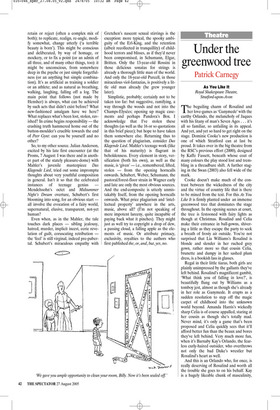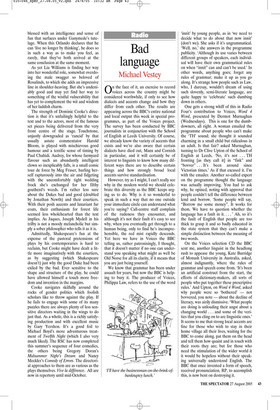Under the greenwood tree
Patrick Carnegy
As You Like It Royal Shakespeare Theatre, Stratford-upon-Avon The beguiling charm of Rosalind and her love-games as ‘Ganymede’ with the earthy Orlando, the melancholy of Jaques with his litany of man’s Seven Ages ... it’s all so familiar, so unfailing in its appeal. And yet, and yet so hard to get right on the stage. Dominic Cooke’s new production is one of which Stratford can at last be proud. It takes over in the big theatre from the RSC’s previous effort (2000), designed by Kaffe Fassett, beneath whose coat of many colours the play stood lost and trembling in a threadbare shift. A further staging in the Swan (2003) also fell wide of the mark.
Cooke doesn’t make much of the contrast between the wickedness of the city and the virtue of country life that is there to be mined from the text. For this As You Like It is firmly planted under an immense greenwood tree that dominates the stage throughout. In the opening scenes at court, the tree is festooned with fairy lights as though at Christmas. Rosalind and Celia make their entrance in ball-gowns, shivering a little as they escape the party to seek a breath of frosty air outside. You’re not surprised that Lia Williams’s Rosalind is blonde and slender in her ruched grey gown, rather more so that cousin Celia, brunette and dumpy in her sashed plum dress, is a bookish lass in glasses.
Regal in their little tiaras, both girls are plainly unimpressed by the gallants they’ve left behind. Rosalind’s magnificent gambit, ‘What think you of falling in love?’, is beautifully flung out by Williams as a tomboy jest, almost as though she’s already in her role as Ganymede. It erupts as a sudden resolution to step off the magic carpet of childhood into the unknown world beyond. Amanda Harris’s wickedly sharp Celia is of course appalled, staring at her cousin as though she’s totally mad. Never mind, it’s only a game that’s been proposed and Celia quickly sees that it’ll afford better fun than the beaux and bores they’ve left behind. Very much more fun, when it’s Barnaby Kay’s Orlando, the fearless curly-haired outsider, who overthrows not only the bad Duke’s wrestler but Rosalind’s heart as well.
And this is an Orlando who, for once, is really deserving of Rosalind and worth all the trouble she goes to on his behalf. Kay is a hugely likeable chunk of masculinity, blessed with an intelligence and sense of fun that surfaces under Ganymede’s tutelage. When this Orlando declares that he can ‘live no longer by thinking’, he does so in such a way as to make you feel, as rarely, that they’ve both arrived at the same conclusion at the same moment.
As yet Lia Williams is finding her way into her wonderful role, somewhat overdoing the male swagger so beloved of Rosalinds, to which she adds an impressive line in shoulder-heaving. But she’s undeniably good and may yet find her way to something of the wistful vulnerability that has yet to complement the wit and wisdom of her laddish charm.
The strength of Dominic Cooke’s direction is that it’s unfailingly helpful to the text and to the actors, most of the famous set pieces being delivered from the very front centre of the stage. Touchstone, unjustly downgraded as ‘rancid’ by that usually astute commentator Harold Bloom, is played with mischievous good humour and a terrific sense of timing by Paul Chahidi. Audrey, for whose farmyard flavour such an abundantly intelligent clown so inexplicably falls, is a small comic tour de force by Meg Fraser, hurling herself rapturously into the air and fidgeting with the uncomfortably tight wedding frock she’s exchanged for her filthy goatherd’s weeds. I’m rather less sure about the Dukes bad and good (doubled by Jonathan Newth) and their courtiers. With their posh accents and luxuriant fur coats, their enthusiasm for forest life seemed less wholehearted than the text implies. As Jaques, Joseph Mydell in his trilby is not a moody melancholic but simply a sober philosopher who tells it as it is.
Admittedly, Shakespeare’s fun at the expense of the pastoral pretensions of plays by his contemporaries is hard to reclaim, but Cooke might have dealt a little more imaginatively with the courtiers, as by suggesting (which Shakespeare doesn’t) just why the good Duke had been exiled by the bad. Ever sensitive to the shape and structure of the play, he could have allowed himself a touch more freedom and invention in the margins.
Cooke navigates skilfully around the rocks of gender politics which foolish scholars like to throw against the play. If he fails to engage with some of its many puzzles there are always plenty of less sensitive directors waiting in the wings to do just that. As a whole, this is a richly satisfying production and with excellent music by Gary Yershon. It’s a good foil to Michael Boyd’s more adventurous treatment of Twelfth Night (which I also very much liked). The RSC has now completed this summer’s sequence of four comedies, the others being Gregory Doran’s Midsummer Night’s Dream and Nancy Meckler’s Comedy of Errors. The directorial approaches to them are as various as the plays themselves. Vive la différence. All are now in repertory until mid-October.












































 Previous page
Previous page